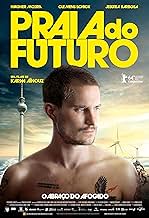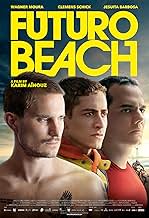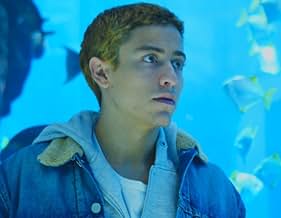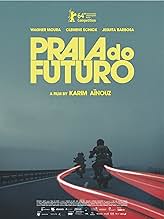Praia do Futuro
NOTE IMDb
6,3/10
3,5 k
MA NOTE
Ajouter une intrigue dans votre langueShortly after failing to rescue a drowning man, Donato meets Konrad, a friend of the victim. They soon begin a relationship which seems doomed from the start, while Donato's past catches up ... Tout lireShortly after failing to rescue a drowning man, Donato meets Konrad, a friend of the victim. They soon begin a relationship which seems doomed from the start, while Donato's past catches up with him.Shortly after failing to rescue a drowning man, Donato meets Konrad, a friend of the victim. They soon begin a relationship which seems doomed from the start, while Donato's past catches up with him.
- Réalisation
- Scénario
- Casting principal
- Récompenses
- 11 victoires et 20 nominations au total
Demick Lopes
- Capitão Motta
- (as Démick Lopes)
Yannik Burwiek
- Filho de Heiko
- (as Yannik Burwieck)
Jesuíta Barbosa
- Ayrton - 18 anos
- (as Jesuita Barbosa)
Avis à la une
Donato (Wagner Moura -'Elite Squad') is a lifeguard at 'Praia do futuro' and gets called into action one day when two German tourists get into trouble in the turbulent surf. Donato is unable to save him but afterwards meets Konrad - this is the friend of the drowned man and he is gay - just like Donato.
Well one thing leads to another and they get romantically entwined. It is a relationship built on lust and though that can survive for a while it always seems doomed to failure. Whilst the inevitable catches up on the love front, Donato seems to have also, not run, but ambled away from his past and family. That is a past with a memory and it is just as inevitable that it too will catch up with him.
Now this is a very well made and observed film, with some stunning scenes and a confidence to know when to ramp up the ante and when to let it meander by in a pique of self absorption. There is a smattering of bedroom action, but simulated and nothing over the top. This is a relationship piece more than anything else and covers most of the bases. It has a full range of emotions too and reactions but approaches its subject from the view that there is essentially good in all of us. This is a film for those who want to be made to think and if that floats your boat then I think you will get a lot from this film.
Well one thing leads to another and they get romantically entwined. It is a relationship built on lust and though that can survive for a while it always seems doomed to failure. Whilst the inevitable catches up on the love front, Donato seems to have also, not run, but ambled away from his past and family. That is a past with a memory and it is just as inevitable that it too will catch up with him.
Now this is a very well made and observed film, with some stunning scenes and a confidence to know when to ramp up the ante and when to let it meander by in a pique of self absorption. There is a smattering of bedroom action, but simulated and nothing over the top. This is a relationship piece more than anything else and covers most of the bases. It has a full range of emotions too and reactions but approaches its subject from the view that there is essentially good in all of us. This is a film for those who want to be made to think and if that floats your boat then I think you will get a lot from this film.
The thing that struck me the most about this movie is how beautiful it is, and I mean literally, aesthetically. Not only is the scenery gorgeous, but also its camera work is outstanding: Praia do Futuro's shots are absolutely amazing, most scenes could be made into pictures to be hung on the walls of an art gallery - there could probably be a whole exposition just made with screenshots of this movie.
The film's appeal, however, doesn't go much beyond that. Its plot had potential, the trailer made it seem like it would be intense and deeply emotional, yet the whole story is quite dull, with some unclear or poorly explained parts and underdeveloped dialogue. The characters don't lack depth per se, but their personalities were rather shallowly explored, perhaps hindered by the lack of vocal expression or by the stumbling plot.
Contrarily to what a review I read (in another website) suggested, I did not feel like this movie was too cliché-ridden, and the unoriginal moves were fairly understandable, as they could be justified by either the situation in which they were inserted or the characters' psyche. Yet, I feel the innovative elements were obscured by the overall dephtlessness of the whole production and great ideas and quotes were lost in senselessness and barely-existent dialogue.
This is definitely not a bad movie, it was just not enough to touch or affect me in any way.
The film's appeal, however, doesn't go much beyond that. Its plot had potential, the trailer made it seem like it would be intense and deeply emotional, yet the whole story is quite dull, with some unclear or poorly explained parts and underdeveloped dialogue. The characters don't lack depth per se, but their personalities were rather shallowly explored, perhaps hindered by the lack of vocal expression or by the stumbling plot.
Contrarily to what a review I read (in another website) suggested, I did not feel like this movie was too cliché-ridden, and the unoriginal moves were fairly understandable, as they could be justified by either the situation in which they were inserted or the characters' psyche. Yet, I feel the innovative elements were obscured by the overall dephtlessness of the whole production and great ideas and quotes were lost in senselessness and barely-existent dialogue.
This is definitely not a bad movie, it was just not enough to touch or affect me in any way.
As beautiful a cinematic essay on the subject of fear as I've seen in a while, Karim Aïnouz's "Futuro Beach" manages to cover a plethora of fears common to the human condition - fear of solitude, fear of commitment, fear of rejection, fear of change, fear of death (hell, even fear of water is covered) – and the remarkable human ability to overcome them.
Donato (Wagner Moura) is a lifeguard at a Brazilian Beach who is only able to save one of two German tourists from drowning. Having never had to face death before, he reaches out to the surviving tourist Konrad (Clemens Schick) and soon finds himself in a complex relationship that leads him to question who he is and what he wants from life. Faced with making difficult choices, including the decision to abandon his younger brother and mother and relocate to Germany to join Konrad, Donato finds that his fears have followed him. Eventually isolating himself from Konrad and still unable to deal, he finds himself living a solitary life until he comes face-to-face with his past. Only then can he finally begin the journey of self-acceptance necessary to move beyond the fears that have held him back from experiencing a full life.
Cinematographer Ali Olay Gözkaya's stunning photography captures the natural beauty of the Brazilian and European locations and enhances the story's mood and tone. Performances are strong from the two principals and the two actors playing the younger brother Ayrton, ages 10 and 18 (Sávio Ygor Ramos and Jesuíta Barbosa,) also acquit themselves nicely. The scenes with the two brothers ably capture the special bond often shared between male siblings.
Often jumping from moments of quiet and solitude to scenes with pulsating sounds and action, "Futuro Beach" grabs you from its opening shots of motorcyclists dwarfed by the turbines of a wind farm to its concluding POV imagery of another motorcycle trek down an endless road at dusk. It excels at cinematically and dramatically capturing a snapshot of the often emotionally treacherous voyage that is life.
Donato (Wagner Moura) is a lifeguard at a Brazilian Beach who is only able to save one of two German tourists from drowning. Having never had to face death before, he reaches out to the surviving tourist Konrad (Clemens Schick) and soon finds himself in a complex relationship that leads him to question who he is and what he wants from life. Faced with making difficult choices, including the decision to abandon his younger brother and mother and relocate to Germany to join Konrad, Donato finds that his fears have followed him. Eventually isolating himself from Konrad and still unable to deal, he finds himself living a solitary life until he comes face-to-face with his past. Only then can he finally begin the journey of self-acceptance necessary to move beyond the fears that have held him back from experiencing a full life.
Cinematographer Ali Olay Gözkaya's stunning photography captures the natural beauty of the Brazilian and European locations and enhances the story's mood and tone. Performances are strong from the two principals and the two actors playing the younger brother Ayrton, ages 10 and 18 (Sávio Ygor Ramos and Jesuíta Barbosa,) also acquit themselves nicely. The scenes with the two brothers ably capture the special bond often shared between male siblings.
Often jumping from moments of quiet and solitude to scenes with pulsating sounds and action, "Futuro Beach" grabs you from its opening shots of motorcyclists dwarfed by the turbines of a wind farm to its concluding POV imagery of another motorcycle trek down an endless road at dusk. It excels at cinematically and dramatically capturing a snapshot of the often emotionally treacherous voyage that is life.
An award-winning screenwriter once told me the secret to his success. It's knowing and never forgetting the essence of film (and this holds true for directors, actors, cinematographers, make-up artists, and production designers as well).
Simply put, "A movie is a story that's told with pictures. Pictures that move." Every line, every shot, every scene, every setting, every prop, should be informed by this.
Few films exemplify this as well as Karim Aïnouz' "Praia do Futuro." Ainouz has said, "For me film is time, space, and sound distilled in a moving image."
It's also, you can see clearly from this film, about bodies moving in time and space and within architecture.
(There's one memorable scene of muscular lifeguards training on the beach and then running into the sea that's right out of poet Walt Whitman's "I Sing the Body Electric.")
Every shot, every scene in this spare, visual style of storytelling is a work of art, which shouldn't be surprising as Ainouz came to film making in a roundabout way, leaving Fortaleza, Brazil (where the opening of "Praia do Futuro" is set) to study architecture in Brazil's futuristic capital, Brasilia. He then studied fine art in New York, took up painting and photography, only to finally study film in graduate school at NYU. He sees himself primarily as a visual artist.
This is a film about fear and courage, about risking it all. It's also about displacement and freedom. But, unlike Hollywood films, it never spells anything out. These ideas are dealt with elliptically and obliquely and usually through movement and visuals rather than through dialogue. The protagonists move through water and dance and speed-race motorcycles through breathtaking scenery and they make passionate, sensual love.
If you like things spelled out for you and wrapped up with a bow this is not the film for you. Much of what happens, happens off-screen. Characters don't talk about their feelings or reveal much through dialogue and the ending is cryptic. But pay attention: It's the visuals and motion and actions that reveal everything.
And about that ending--there is some actual "telling" rather than showing in the end (don't worry, it's not a spoiler) and it's so emblematic of the film I'll cite it here. As we see two motorcycles disappear into the gray mist on a twisting, turning German autobahn, Donato, in a voice-over, addresses his brother, the one he'd abandoned eight years earlier when he left Brazil for Germany.
"There are two types of fear and courage, Speed. I act as if there is no danger. But you know that everything is dangerous in this endless sea."
"Praia do Futuro" invites you to take a swim, take a risk, try your luck. It doesn't promise a happy ending, but it doesn't preclude one, either.
Simply put, "A movie is a story that's told with pictures. Pictures that move." Every line, every shot, every scene, every setting, every prop, should be informed by this.
Few films exemplify this as well as Karim Aïnouz' "Praia do Futuro." Ainouz has said, "For me film is time, space, and sound distilled in a moving image."
It's also, you can see clearly from this film, about bodies moving in time and space and within architecture.
(There's one memorable scene of muscular lifeguards training on the beach and then running into the sea that's right out of poet Walt Whitman's "I Sing the Body Electric.")
Every shot, every scene in this spare, visual style of storytelling is a work of art, which shouldn't be surprising as Ainouz came to film making in a roundabout way, leaving Fortaleza, Brazil (where the opening of "Praia do Futuro" is set) to study architecture in Brazil's futuristic capital, Brasilia. He then studied fine art in New York, took up painting and photography, only to finally study film in graduate school at NYU. He sees himself primarily as a visual artist.
This is a film about fear and courage, about risking it all. It's also about displacement and freedom. But, unlike Hollywood films, it never spells anything out. These ideas are dealt with elliptically and obliquely and usually through movement and visuals rather than through dialogue. The protagonists move through water and dance and speed-race motorcycles through breathtaking scenery and they make passionate, sensual love.
If you like things spelled out for you and wrapped up with a bow this is not the film for you. Much of what happens, happens off-screen. Characters don't talk about their feelings or reveal much through dialogue and the ending is cryptic. But pay attention: It's the visuals and motion and actions that reveal everything.
And about that ending--there is some actual "telling" rather than showing in the end (don't worry, it's not a spoiler) and it's so emblematic of the film I'll cite it here. As we see two motorcycles disappear into the gray mist on a twisting, turning German autobahn, Donato, in a voice-over, addresses his brother, the one he'd abandoned eight years earlier when he left Brazil for Germany.
"There are two types of fear and courage, Speed. I act as if there is no danger. But you know that everything is dangerous in this endless sea."
"Praia do Futuro" invites you to take a swim, take a risk, try your luck. It doesn't promise a happy ending, but it doesn't preclude one, either.
"Beach" opens with two motorcycle riders riding along the sand, and cooling off in the waters of a nearby beach; When one of them drowns, the lifeguard tries, but fails to save him. The lifeguard Doni, ( Wagner Moura) strikes up a "friendship" with the buddy of the guy that was lost (Clemens Schick). Lots of hot guys. The friendship turns into more... but the plot development moves pretty slowly. Konrad wants Doni to stay, but Doni wants to get back to his job and his family. Full frontal nudity. Lots of butt shots. Not a lot of dialogue, but maybe that's part of the charm. A whole lot of dancing in nightclubs. Some GREAT scenes of a giant indoor aquarium, and also many ocean scenes. Then his family issues catch up with him. Doni must decide what's important to him. The ending was a little metaphysical, but you can judge for yourself. Certainly worth the price of a DVD on amazon.com.
Directed by Brazilian director Karim Aïnouz, who has done numerous films. Co-wrote this with Felipe Bragança. Very Euro.
Directed by Brazilian director Karim Aïnouz, who has done numerous films. Co-wrote this with Felipe Bragança. Very Euro.
Le saviez-vous
- AnecdotesAccording to Clemens Schick, he and Wagner Moura did not get along when they first met, but became close friends after filming their scenes.
- GaffesWhen Konrad drives around on a KTM in Germany, the motor noise you hear is clearly from a 4-in-a-row cylinders engine. But KTM only manufactures 1 and 2 cylinders motors that would never sound like this.
- Versions alternativesThe first love scene in the film's Part II section (containing footage of oral sex being performed) was cut in the theatrical/home video release.
- Bandes originalesHeroes
Written by David Bowie and Brian Eno
Meilleurs choix
Connectez-vous pour évaluer et suivre la liste de favoris afin de recevoir des recommandations personnalisées
- How long is Futuro Beach?Alimenté par Alexa
Détails
- Date de sortie
- Pays d’origine
- Sites officiels
- Langues
- Aussi connu sous le nom de
- La plage du désir
- Lieux de tournage
- Sociétés de production
- Voir plus de crédits d'entreprise sur IMDbPro
Box-office
- Budget
- 4 000 000 $US (estimé)
- Montant brut aux États-Unis et au Canada
- 20 262 $US
- Week-end de sortie aux États-Unis et au Canada
- 3 324 $US
- 1 mars 2015
- Montant brut mondial
- 779 835 $US
- Durée1 heure 46 minutes
- Couleur
- Rapport de forme
- 2.35 : 1
Contribuer à cette page
Suggérer une modification ou ajouter du contenu manquant

Lacune principale
By what name was Praia do Futuro (2014) officially released in Canada in English?
Répondre
























